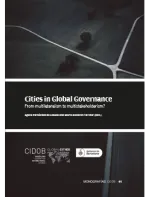Cities and international law: legally invisible or rising soft-power actors?

Traditional state-centric international law does not recognise local government as “subjects” of international law. But this is merely one understanding of international law, which is in itself not static. A pluralist, multistakeholder understanding recognises the increased engagement of local governments with international law and governance in the last decades. Meanwhile, even traditional international law has the tools to recognise – albeit very slowly – new actors that emerge in the field and declare them to enjoy legal personality. Legal personality is then determined by the assessment of the de facto engagement of the new actor in the international legal system. This means that local governments, deliberately or not, have been taking just the right steps by accumulating experience and demonstrating fluency and competence in implementing, negotiating and contesting international law; and accustoming other, more traditional actors of the international community to their presence in the field.